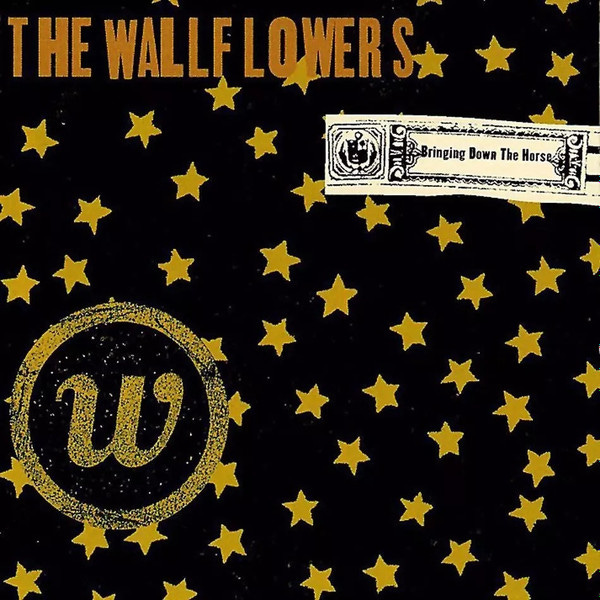The Wallflowers. Bringing Down the Horse. T Bone Burnett. Interscope INTC-90055, 1996, compact disc.
Like many people, I am more of a “listen to music” than a “write about music” kind of person. There are plenty of reviewers out there who do this for a living, some of them who sound pretentious (like Pitchfork) and some who sound genuine (like Ted Gioia). I certainly hope I fall into the latter category, despite my amateur status.1 I don’t know how often I will recommend albums, but if this is the only one I write, it’s the right place to begin.
Bringing Down the Horse was the second album I bought on compact disc, just behind Weird Al’s The TV Album. But unlike my affection for Al Yankovic, I came to the Wallflowers through my dad. He had heard “6th Avenue Heartache” on a local rock station and recommended the album to me on that. Shortly after I purchased the CD, this album blew up with the radio single of “One Headlight,” which was one of my dad’s favorite songs. I had a bit more fondness for “Three Marlenas.” Regardless, the album made a permanent mark on me both through that father-son connection and the musical depth of the album. In some sense, the Wallflowers set me on track to want something richer in the sound of the music I loved over the years.
I don’t want to assume too much about the intention of the band when putting together the record. But there are some real musical gems on this album, and the arrangement of the tracks allows for a fluid experience. The first four tracks all have a rather slow, somber sound to them, with the orchestral elements making the songs reflective rather than complaintive. “The Difference” shakes things up with a rousing drum performance. The lyrics of the song still keep with the overall sense of being lost, or rather defeated as Jakob Dylan explained.2 The instrumental complexity is one of those things that makes listening to the album so rewarding. The tambourine on “Laughing Out Loud” becomes an essential part of the song without the listener really even noticing. The sections where it drops out sound less full, less energetic. And the concluding track “I Wish I Felt Nothing,” while somewhat simpler musically, still retains that sense that there is something rich in the sound that accompanies the heartbreaking lyrics.
While I don’t think an album hangs or falls on the character of the musician, I do find Dylan rather fascinating. Jakob Dylan, who authored all the tracks on this album, is a peculiar man in the American musical scene.3 As the child of Bob Dylan, there has always been a lot of focus on that familial connection, which Dylan has spoken of rarely.4 And he espouses nothing but affection for the album that made him famous almost 30 years ago, contrasted with musicians who refuse to play famous songs or yell at audience members who won’t sing along.5 Dylan seems to have a genuine appreciation for his fans, and there are still a lot of them who think highly of Bringing Down the Horse.
Each song on the album stands on its own, which is evident from the four singles the album produced (even though the record label thought there would be one, at best). But the whole thing is a wonderful listening experience as well. In an age of Spotify playlists and overly repetitive radio stations, sitting with one album and listening all the way through (without shuffle turned on) can be a real treat. And Bringing Down the Horse is an album everyone should sit down and savor. The tracks move well from one to the next, with each song promising a full sound and lyrical creativity. I’ve been listening to this album for almost thirty years. And I don’t think I’ll be stopping anytime soon.
This is largely an experiment inspired by Roger Scruton and his great love of Richard Wagner, a love I share.
Dylan’s interviews are interesting to me because he always sounds rather matter-of-fact, which is not what I expect from most successful musicians. cf. https://web.archive.org/web/20061013155033/http://www.the-wallflowers.net/article_unlimited.htm
In 2014, when the American Diabetes Association awarded Dylan with their “Father of the Year” honors, they noted that while he is famous for his music, “his most important role to date has been raising his children with his wife, screenwriter Paige Dylan.” cf. https://web.archive.org/web/20140705025413/http://main.diabetes.org/site/TR/FatheroftheYear/FOTYContent?px=9944283&pg=personal&fr_id=9575.
In a New York Times interview, Jakob explained: “my dad belongs to me and four other people exclusively. I'm very protective of that.” I think that trumps the kind of voyeuristic interest that is out there. Cf. https://web.archive.org/web/20121026200527/http://www.nytimes.com/2005/05/08/arts/music/08decu.html?pagewanted=all&_r=0.
A couple of examples from my own life. At a small local show in Destin, FL, Duncan Sheik refused to play “Barely Breathing” despite audience requests. And while touring with the Counting Crows, Johnny Reznik of the Goo Goo Dolls went on a profanity-laced rant about the guy on the front row who wouldn’t sing along to “Name.” I don’t know if either musician regrets those moments, but they are a far cry from the humble gratitude espoused by Dylan. Cf. https://americansongwriter.com/qa-the-wallflowers-jakob-dylan-remembers-bringing-down-the-horse/2/.





